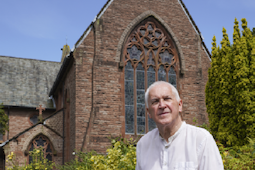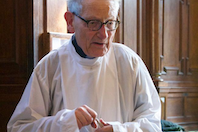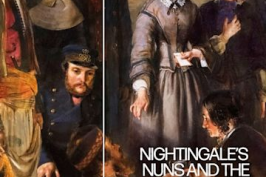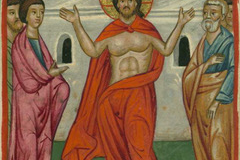Good Friday Reflection with Fr Terry Tastard
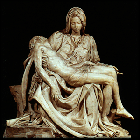
Michaelangelo's Pieta
In the first few centuries of the Church, as thinkers were trying to understand the meaning of the cross, often they summed up their conclusions in one short phrase: 'The uncrucified is the unhealed.' They linked Christ on the cross to the healing of humankind.
Think of it as a coin with two sides. On one side of the coin is human sinfulness. Our tendency to violence, jealousy, resentment, exploitation, in short, our inflamed passions. Jesus takes upon himself this human weakness and displays it on the cross. The cross is human weakness and wickedness writ large. It confronts us with a part of human nature that we only have to open the newspaper to see again and again. Sometimes we only have to look into our own hearts.
We do this to a wonderful man, but to more than that. We must resist the temptation of our era to see Jesus as a good man and nothing more. Because the point of the cross is that we do this not only to a good man, but to one who was the Son of God. In him the human and the divine are united. We do it to God himself. Hold on to this, because it is essential. You see, although this is a confrontation, it is not a rejection of us. On the cross God confronts us with ourselves, but his verdict is not one of damnation. Rather, the cross becomes an assurance of love, of mercy, of forgiveness. Just as on the cross Jesus says: "Father, forgive them, for they know not what they do." Human sin is taken to the cross in the wounds inflicted on Jesus, and having been crucified, it is healed, through our repentance as we understand the limitless depths of God's mercy. Our sin is crucified and we are healed.
Then there is the other side to the coin. It is not only sin that we see on the cross, it is also human suffering. We recognize something of ourselves in the pain and distress of Jesus on the cross. At the back of our church we have on the wall a large crucifix. People come and pray there. Sometimes they touch the the feet of Christ, or they lay their heads against the cross. I find it very moving, very humbling.
All of us know suffering at some time in some way. There are frightening illnesses like cancer. There are troubles of the mind like depression or the deep dread that takes the form of crippling anxiety. Good people who entered marriage with a sincere heart find that even so, their relationship is strained or even fractured. Jobs disappear and great worry can come with that. Workplaces can be harsh and demanding. Families can fall apart under the strain of someone's addiction to drink or drugs or gambling. In sum, human suffering can be very real, and can take many forms.
At times like these, we look again at that figure on the cross. Somehow, because we know that Jesus understands, we find a healing and a peace even in the midst of our afflictions. This is possible because we realise that Jesus knows from the inside what suffering is like. In that short, powerful phrase we hear today from Isaiah and apply to Jesus, he is 'a man of sorrows'. And we come to the cross when we are men or women of sorrows. We bring our pain and bury it in the wounds of Christ. Once more, his suffering becomes our healing.
The paradoxes are amazing. Only God could do it.
The humiliation of God raises up a fallen mankind.
Life on the cross ebbs away, but new life for us begins.
In the midst of suffering, there is peace.
By his wounds, we are healed.
Fr Terry is Parish Priest at Holy Trinity Catholic Church in Brook Green, west London. His new book: Ronald Knox and English Catholicism is published by Gracewing at £12.99 and is available on Amazon, from religious booksellers and from the publisher.
For more information see: www.holytrinityw6.org



